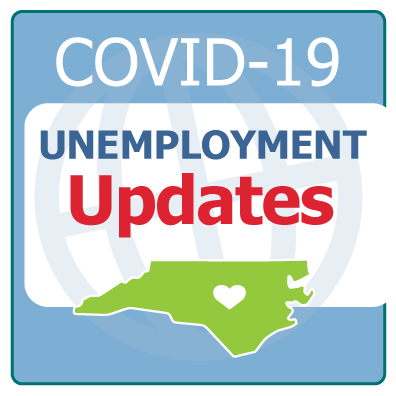UPDATE: Changes to NC Unemployment Filing

Since the beginning of the COVID-19 pandemic, Unemployment Insurance (UI) has been one of Arts North Carolina’s key policy concerns. There are now roughly 21,000 new unemployment claims filed in North Carolina every day, and while Federal Unemployment Assistance provided in the CARES Act will provide need relief to many, there are still challenges implementing these new systems, and changes that are being made to accommodate the increased demand for benefits.
There was a major change in how Employers can address COVID-19 Unemployment announced last week as part of Governor Cooper’s Executive Order 131. Many restrictions have been relaxed by the NC Department of Employment Security (NCDES) concerning an employer’s ability to file unemployment claims for their workers who have been laid-off, called an “attached” claim, as a result of COVID-19. Employers can now file pandemic related attached claims for their employees more than once a year for periods of up to six weeks, regardless of whether that employer has a negative NCDES credit balance. This will allow these claims to be processed more quickly instead of having NCDES notify the employer of each individually filed claim and then waiting for that employer to verify or deny each claim. The result is that many unemployed North Carolinians will receive needed benefits faster. Arts NC and our lobbyists, Ken Melton and Associates, have been working on this issue since mid-March with NCDES, and we are pleased to see this much needed change enacted.
The NC Department of Employment Security (NCDES) is still awaiting guidance and working to implement Pandemic Unemployment Assistance (PUA), the program that will provide benefits for those who had not been previously covered by the state unemployment system. Last week it was posted on the NCDES website that while the self-employed and independent contractors can file claims now, that claims being covered by the PUA are not expected to be process until April 25th. These benefits will be assessed and paid retroactively to the full extent applicants are eligible under the PUA. NCDES continues to work through several challenges and is regularly updating available COVID-19 Unemployment Information for Individuals.
Last week the NC House of Representatives Select Committee on COVID-19 Economic Support Working Group received a presentation detailing the three component of Federal Unemployment Assistance provided in the CARES Act: Federal Pandemic Unemployment Compensation (FPUC), Pandemic Emergency Unemployment Compensation (PEUC), and Pandemic Unemployment Assistance (PUA). The presentation (listed below) was produced by the Fiscal Research Division, a non-partisan staff agency of the North Carolina General Assembly.
CARES Act Highlights of Unemployment Provisions
Major CARES Act Unemployment Insurance (UI) Provisions:
- Federal Pandemic Unemployment Compensation (FPUC) (additional $600 per week)
- Pandemic Emergency Unemployment Compensation (PEUC) (additional 13 weeks of UI benefits)
- Pandemic Unemployment Assistance (PUA)
Federal Pandemic Unemployment Compensation (FPUC)
- Provides an additional $600 per week in UI benefits paid for weeks after March 29, 2020 – July 31, 2020.
- Additional compensation of $600 per week is provided concurrently with regular UI benefits.
- Maximum weekly benefit amount (WBA) for individuals eligible for maximum regular UI benefit in NC: $350(max) + $600 = $950.
- Additional compensation of $600 per week is available for majority of UI programs during eligible weeks.
- Receipt of FPUC is not dependent on unemployment being related to COVID-19.
Pandemic Emergency Unemployment Compensation (PEUC)
- Provides up to 13 additional weeks of UI benefits to individuals who have exhausted their regular UI benefits with respect to their benefit year; have no rights to regular UI benefits; and are able, available and actively seeking work.
- The UI benefit during this period is the amount the individual would have otherwise been entitled to under State law, plus $600 for weeks claimed after March 29, 2020 – July 31, 2020.
- After July 31, 2020, UI benefit amount reverts to regular UI benefit available under State law.
Pandemic Unemployment Assistance (PUA)
- Covers individuals who do not qualify for regular UI benefits
- Exhausted regular UI benefits
- Self-employed and independent contractors
- Otherwise do not qualify for any other UI programs, such as an individual with non-covered employment, insufficient work history, or insufficient wages
- Does not include individuals with the ability to telework with pay; or who are receiving sick leave or other paid benefits.
- Provides up to 39 weeks of UI benefits, minus any other weeks claimed under regular UI or Extended Benefits (EB).
- Does not include PEUC weeks.

- Claimants must self-certify that they are unable to work for specified reasons related to COVID-19.
- The amount and duration of benefits is equal to the amount the claimant would have otherwise be entitled to as a regular UI benefit under State law, plus an additional $600 per week for weeks after March 29, 2020 – July 31, 2020.
- PUA is payable for weeks of unemployment, partial unemployment, or inability to work caused by COVID-19 related reasons beginning on or after January 27, 2020.
- PUA is not payable for any week of unemployment ending after December 31, 2020.
Summary of CARES Act UI Provisions
- Provides an additional $600 per week in UI benefits, through July 31st.
- Extends UI benefit duration by 13 weeks.
- Provides UI benefits to workers impacted by COVID-19 that are not covered under any other UI program for a period up to 39 weeks.
- PUA, PEUC, and FPUC are 100% federally funded. This includes expenses related to associated expansion of benefits, duration and administrative costs.
- All federal programs expire Dec. 31, 2020.


